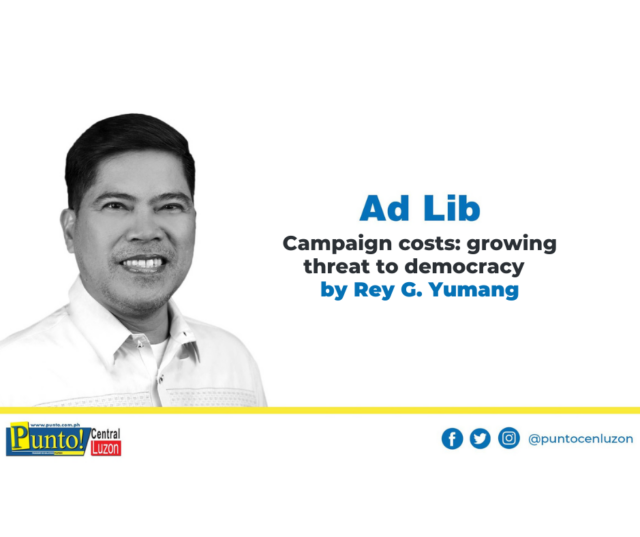THE PRICE of running for public office in the Philippines has spiralled out of control and transformed what should be a fair contest of ideas, issues, advocacies and policy reforms into a high-stakes battle of campaign war chest. The astronomical amounts spent on political advertisements have turned the election process into a game of money. Undoubtedly, this trend leaves behind a troubling reality: qualified candidates who lack the financial resources are systematically pushed aside in favor of those with ultra-deep pockets. As a result, the very essence of democracy is weakened and the most qualified and capable individuals are prevented from being elected into public offices to serve the people.
A case in point is this year’s mid-term senatorial elections. Even before filing their certificates of candidacy, Sen. Imee Marcos and Las Piñas Rep. Camille Villar had already spent P1 billion each for their campaign ads on television and radio according to a report by the Philippine Center for Investigative Journalism. Their ad spending on traditional media accounted for half of the total P4.1 billion. In terms of radio ads, Villar and Marcos had spent P183 million and P80 million, respectively. As for Facebook advertising, Villar is the top spender with P18 million from July to December 2024. On the other hand, Marcos had paid P925,000 via her FB Page, Imee for the PH. To think that the campaign is yet to start officially.
These numbers are staggering, especially when compared to the average Filipino’s yearly income. According to the 2023 report from the Philippine Statistics Authority, the average Filipino household makes an annual income of P353,230; this only means that the amount these candidates had spent on ads could easily surpass the yearly earnings of an entire household. This financial arms race creates an insurmountable barrier for qualified candidates without financial backing, such as grassroots activists, labor leaders, human rights lawyers, educators, or other professionals who truly understand the needs of the people.
Equating these numbers with the salary grade and annual salary of senators based on the Salary Standardization Law is even more scandalous and puzzling. Senators and members of the House of Representatives enjoy salary grade 31 and receive an annual income of approximately P2.8 million. One cannot help but ask: What on earth would make someone spend hundreds of millions, or even more than a billion pesos, on campaign ads for a job that pays P17 million for one full term of six years?
What is even worse is that the money spent on expensive ads doesn’t necessarily equate to good governance. Political ads often focus on superficial narratives or personalities rather than substantive discussions of policies. Take the case of Villar’s “Bagong Boses” slogan which to me, is a direct insult to many Filipinos who oppose political dynasty. What is so new about another Villar moving from the House of Representatives to the Senate? What about Imee’s penchant to regale many gullible voters with historical revisionism complete with a promise of the Tallano gold to be shared with her family’s loyal supporters? What is pro-Filipino about another Marcos who continues to whitewash the horrors of her late father’s dictatorial regime and refuses to pay estate tax to the country?
Let’s face it, when voters are overwhelmed by the barrage of ads, they are more likely to vote for familiar faces rather than those with proven competence or expertise. Consequently, the electorate becomes more influenced by marketing campaigns than by the actual qualifications and platforms of candidates. This is one sad reality that our politicians continue to exploit. Why would they even try to fix this if it benefits them to the fullest?
This current set-up is both unfair and harmful. Candidates who may be more qualified, with substantial experience and deeper knowledge of public service, are often unable to get their message across without the same level of media exposure. A well-funded candidate can dominate TV screens, social media feeds, and radio waves, leaving little or no room for less-funded candidates to present their platforms. The result is a system where financial resources—rather than the merit of a candidate’s policies—often determine electoral success.
Elections should be about the voters’ will, not the amount of money a candidate can spend to secure votes. If the trend of escalating political ad costs remains unchecked, we perpetuate a system where only the wealthy can run for office, leaving the needs of the poor and marginalized unaddressed. As expected, the Filipino people remain at the losing end.





